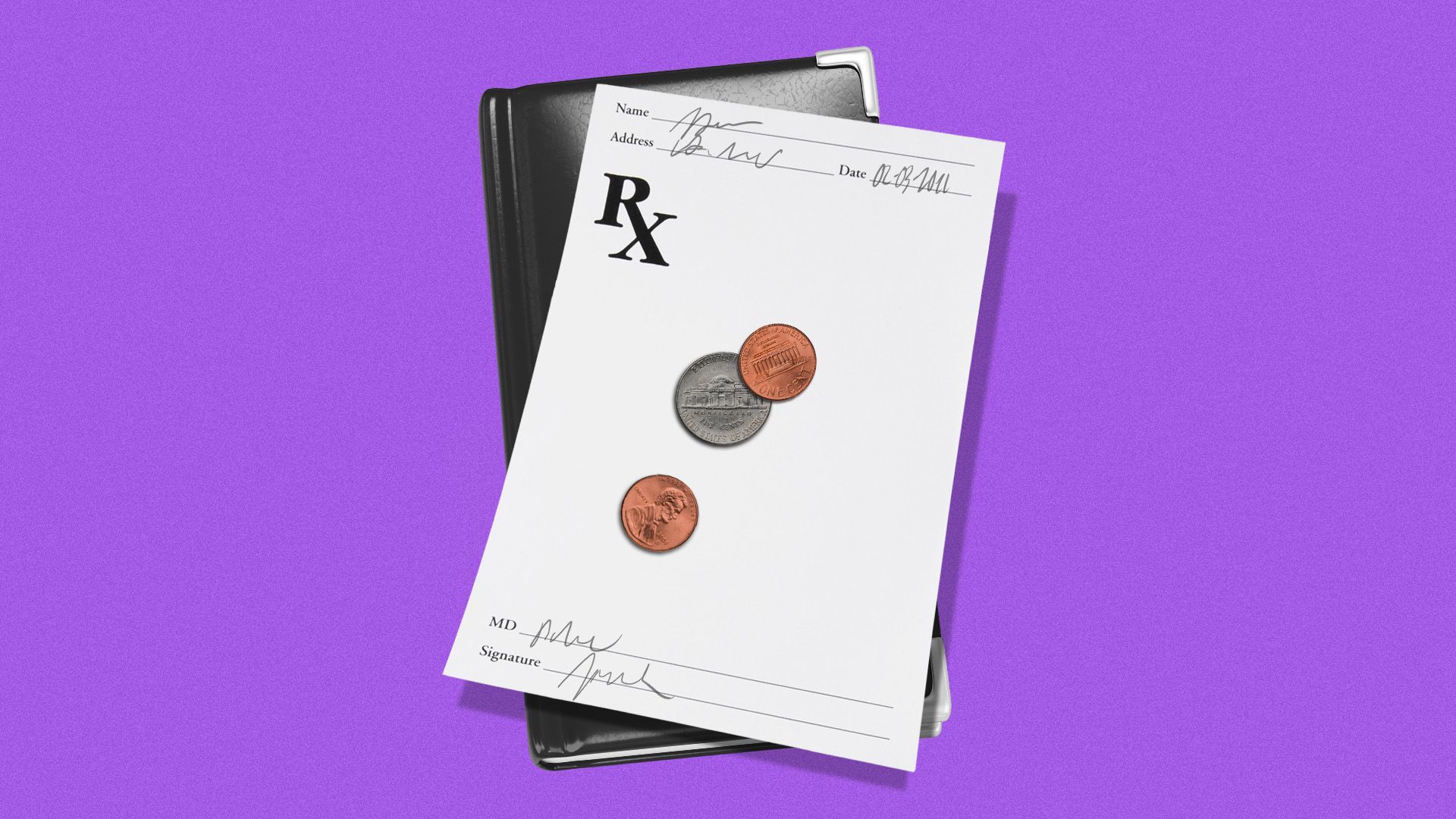Pharmacies feel stiffed on COVID pill payments
Add Axios as your preferred source to
see more of our stories on Google.

Illustration: Sarah Grillo/Axios
Some pharmacies are getting paid as little as $1 to dispense the COVID antiviral pills made by Pfizer and Merck.
Why it matters: Most pharmacies want to offer the drugs, especially the one from Pfizer that drastically cuts the odds of hospitalization and death. But low payments could hurt Americans' ability to access the pills in some areas if pharmacies decide they can't afford to stock them.
How it works: Pharmacies are paid an "ingredient cost" and a "dispensing fee" for drugs.
- The ingredient cost covers how much pharmacies have to pay to acquire a drug.
- The dispensing fee covers the pharmacist's services, staff, overhead and profit.
- Because the federal government paid for the COVID pills, dispensing fees are the only payments pharmacies are getting for these drugs.
- Last November, federal officials told pharmacy benefit managers to pay dispensing fees for the COVID pills that are "sufficient to ensure eligible patients can readily access these drugs at available pharmacies," and the fees "may be higher than a sponsor's usual negotiated dispensing fees given the unique circumstances" of the pandemic.
By the numbers: Here are the dispensing fees that PBMs are currently paying to pharmacies for the COVID pills, according to four industry sources.
- Prime Therapeutics: $1
- Humana: $2
- Express Scripts: $6
- CVS Caremark: $10
- OptumRx: $10.50
The big picture: All of those numbers are lower than the federal government's dispensing fee for uninsured patients, which is $12. Some Medicaid programs pay around $10. Federal reimbursement for giving a COVID vaccine, by comparison, has been a profitable $40.
- Ilisa Bernstein, a lobbyist with the American Pharmacists Association, called the current fees "absolutely ridiculous" because it could take pharmacists up to 45 minutes to properly dispense the antivirals.
- Pharmacists have to make sure patients are positive for COVID, and they have to check what medications patients take because there are a lot of potentially bad drug interactions with these antivirals. People with kidney or liver problems also need Paxlovid doses altered.
- "Taking all those steps — that's fine," Bernstein said. "It's just not getting appropriately paid for the time it takes to do that."
- Steve Burney, the owner of Foothills Pharmacy in Columbus, North Carolina, said he stopped offering the pills due largely to the low reimbursement.
The other side: The Pharmaceutical Care Management Association, which lobbies on behalf of PBMs, did not make anyone available for an interview.
- PCMA pointed to a blog post written by CEO J.C. Scott, which said PBMs are "voluntarily paying dispensing fees for these drugs, which are not technically covered by Medicare and other insurance," and "most PBMs are paying standard or Medicaid-level" fees.
- Prime Therapeutics said in a statement it is "evaluating how best to balance pharmacy demands for increased reimbursement with our clients' and consumers' desire to keep health care costs more affordable."
- OptumRx, which is owned by UnitedHealth Group, said in a statement its dispensing fee was "in-line with industry standards and balances the need to fairly compensate pharmacies with providing cost-effective pharmacy benefits."
- CVS did not comment beyond saying it does not disclose information on dispensing fees.
- Express Scripts and Humana did not respond.
Between the lines: Pharmacists have a vested interest in calling for higher fees for the antivirals, but in the short term they believe a fee near the $40 vaccine payments is justified.
- "As we become more efficient with this, maybe the dispensing fee doesn't have to be that high," said Steve Moore, a pharmacist in Plattsburgh, New York, who has dispensed Paxlovid and molnupiravir. But, "you've got a new drug. It's more work."
